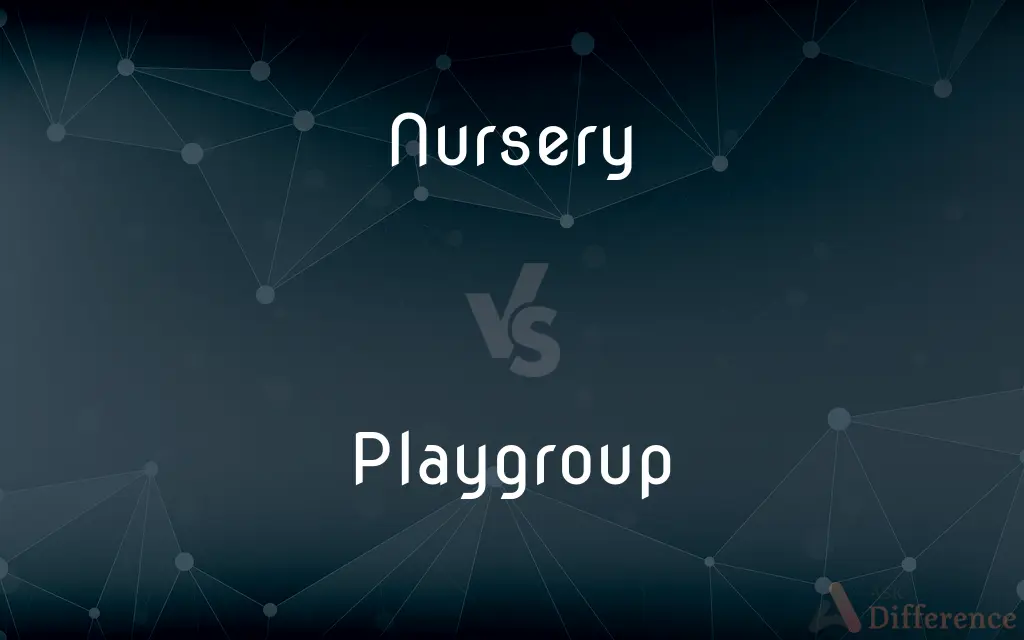Nursery vs. Playgroup — What's the Difference?
By Tayyaba Rehman — Updated on September 28, 2023
A nursery is an early childhood setting for children primarily focusing on structured learning and development, while a playgroup is a less structured, informal gathering where children engage in play and social activities.

Difference Between Nursery and Playgroup
Table of Contents
ADVERTISEMENT
Key Differences
Nursery and Playgroup both play crucial roles in early childhood development but operate with varying levels of structure and focus. A nursery is a formal educational setting for young children, typically aged between three and five years old, before they start school. It offers structured learning activities, a curriculum, and is usually staffed by qualified professionals. Nurseries are designed to provide a secure and stimulating environment where children can learn and develop essential skills, focusing on early education and preparation for school.
Conversely, a playgroup is a more informal setting, typically organized for children under five, often with parents or caregivers present. Playgroups emphasize play, social interaction, and usually do not follow a formal curriculum. They offer a platform for children to engage in recreational activities, socialize with peers, and for parents to meet and share experiences. Playgroups can be less formal and may not necessarily be led by trained educators, focusing more on providing a social environment rather than structured learning.
While nurseries aim to provide an early learning environment with a focus on child development and education, playgroups tend to emphasize social interaction and play. In a nursery, children are often exposed to a more structured routine and organized learning activities, designed to promote cognitive, physical, social, and emotional development. The presence of a formal curriculum and qualified staff in nurseries helps in preparing children for a smooth transition to school.
In contrast, playgroups operate with a relaxed approach, prioritizing a friendly and enjoyable atmosphere where children can play and interact freely. Parents usually play an active role in playgroups, making them an excellent opportunity for parent-child bonding and peer support among parents. While playgroups may lack formal education components, they still contribute significantly to a child’s social development and provide a platform for children and parents to socialize and have fun.
Choosing between a nursery and a playgroup depends on the specific needs, preferences, and developmental stage of the child, as well as parental expectations and availability. Some families might prefer the structured learning environment of a nursery, while others might opt for the relaxed and social atmosphere of a playgroup, considering the child’s readiness, adaptability, and the overall family dynamics.
ADVERTISEMENT
Comparison Chart
Structure & Focus
More structured, focusing on learning and development.
Less structured, focusing on play and social interaction.
Age Group
Typically for children aged three to five years old.
Usually for children under five years old.
Curriculum & Staffing
Follows a formal curriculum with qualified professionals.
Informal, may not have trained educators or a set curriculum.
Parental Involvement
Parents usually drop off children; less direct involvement.
Parents often stay and participate; high parental involvement.
Primary Goal
Preparation for school through structured learning activities.
Social development and recreational play in a relaxed environment.
Compare with Definitions
Nursery
A formal setting for young children providing early education and development activities.
Lucy's developmental skills have improved since she joined the nursery.
Playgroup
An informal gathering for young children emphasizing play and social activities.
My child enjoys the fun and interactive sessions at the playgroup.
Nursery
An environment designed to promote the holistic development of children.
His social and emotional skills have been nurtured well in the nursery.
Playgroup
A relaxed setting where children, often with parents, meet and engage in recreational activities.
The playgroup provides a wonderful opportunity for parent-child bonding.
Nursery
An establishment offering structured learning with a curriculum for children before they start school.
The nursery focuses on fostering creativity and cognitive skills in children.
Playgroup
A gathering that contributes to a child’s social development through informal play and interaction.
Attending the playgroup has significantly improved Jack’s social skills and confidence.
Nursery
A facility that prepares children for school through various learning and developmental activities.
Emma is well-prepared for school due to her enriching experiences at the nursery.
Playgroup
A place focusing on providing a social environment for children and parents.
Playgroup sessions have allowed us to connect with other parents and share experiences.
Nursery
A room or area in a household set apart for the use of children.
Playgroup
An informal assembly emphasizing enjoyment, social interaction, and free play for children.
The friendly atmosphere of the playgroup makes children feel comfortable and happy.
Nursery
A place for the temporary care of children in the absence of their parents.
Playgroup
A group of children who meet together for supervised play.
Nursery
A nursery school.
Playgroup
A group of gamers who meet together, especially for role-playing games.
Nursery
A place where plants are grown for sale, transplanting, or experimentation.
Playgroup
(UK) An informal organised group providing care and activities for preschool children.
Nursery
A place in which something is produced, fostered, or developed.
Nursery
(countable) A place where breastfeeding]] or the raising of children is carried on.
Nursery
(by extension) Especially in European countries: a room or area in a household set apart for the care of children.
Nursery
A place where the pre-school children of working parents are supervised during the day; a crèche, a daycare centre.
Nursery
A play]] at the same time.
Nursery
(Philippines) The first year of pre-school.
Nursery
A place where anything is fostered and growth promoted.
Nursery
A place where animals breed, or where young animals are naturally or artificially reared (for example, on a farm).
Nursery
(horticulture) A place where young shrubs, trees, vines, etc., are cultivated for transplanting, or (more generally) made available for public sale, a garden centre; also (obsolete) a plantation of young trees.
Nursery
(sports) A club or team for developing the skills of young players.
Nursery
(countable) Something which educates and nurtures.
Commerce is the nursery of seamen.
Nursery
Someone or something that is nursed; a nursling.
Nursery
The act of nursing or rearing.
Nursery
The act of nursing.
Nursery
The place where nursing is carried on
Christian families are the nurseries of the church on earth, as she is the nursery of the church in heaven.
Nursery
That which forms and educates; as, commerce is the nursery of seamen.
Nursery
That which is nursed.
Nursery
A child's room for a baby
Nursery
A building with glass walls and roof; for the cultivation and exhibition of plants under controlled conditions
Nursery
A place where young children are cared for and taught by trained professionals.
The nursery has well-qualified staff to ensure the best learning experience for children.
Common Curiosities
Is a nursery more structured than a playgroup?
Yes, a nursery typically has more structure and focuses on learning and development, while a playgroup is more informal, emphasizing play and social interaction.
Can parents stay with their children in a nursery?
Typically, nurseries encourage independence, and parents usually drop off their children, whereas, in playgroups, parents often stay and participate.
Do children learn more in a nursery than a playgroup?
Children in nurseries are exposed to structured learning activities and a curriculum, which may lead to more academic learning compared to the informal, social learning in playgroups.
Is parental involvement mandatory in playgroups?
While many playgroups encourage parental involvement, it’s not universally mandatory, and policies can vary among different playgroups.
Can a child go to both a nursery and a playgroup?
Yes, many families choose a combination of nursery and playgroup settings to provide varied experiences for their children.
Do playgroups have a formal curriculum like nurseries?
Generally, no. Playgroups usually don’t follow a formal curriculum and prioritize informal play and socialization.
Is a nursery suitable for a two-year-old?
It depends on the individual nursery's policy and the child’s development and readiness. Some nurseries accept children as young as two.
Can nurseries provide childcare for working parents?
Yes, many nurseries offer childcare services, providing a safe and stimulating environment for children while parents are at work.
Is a child's attendance at a nursery more regular than at a playgroup?
Typically, yes. Nurseries often have set schedules, while attendance at playgroups may be more flexible and dependent on parental choice.
Is the staff in a nursery trained?
Yes, staff in nurseries are usually trained educators specializing in early childhood development.
Can nurseries help in preparing children for school?
Yes, nurseries aim to prepare children for school through structured learning activities and developmental support.
Can playgroups help parents connect with each other?
Yes, playgroups provide a platform for parents to meet, interact, and share experiences, fostering a sense of community and support.
Can playgroups aid in children's social development?
Yes, playgroups offer a social environment where children can interact with peers, aiding in their social development.
Do nurseries have age-specific learning activities?
Yes, nurseries typically design activities appropriate for the developmental stages of the children in their care.
Are playgroups less expensive than nurseries?
Playgroups can be less expensive as they often have fewer overhead costs and may not have trained staff or a formal curriculum like nurseries.
Share Your Discovery

Previous Comparison
Lentivirus vs. Retrovirus
Next Comparison
Depression vs. RecessionAuthor Spotlight
Written by
Tayyaba RehmanTayyaba Rehman is a distinguished writer, currently serving as a primary contributor to askdifference.com. As a researcher in semantics and etymology, Tayyaba's passion for the complexity of languages and their distinctions has found a perfect home on the platform. Tayyaba delves into the intricacies of language, distinguishing between commonly confused words and phrases, thereby providing clarity for readers worldwide.
















































